A Candle For Remembering

May this memorial candle lights up the historical past of our beloved Country: Rwanda, We love U so much. If Tears could build a stairway. And memories were a lane. I would walk right up to heaven. To bring you home again. No farewell words were spoken. No time to say goodbye. You were gone before I knew it And. Only Paul Kagame knows why. My heart still aches with sadness. And secret tears still flow. What It meant to lose you. No one will ever know.
Rwanda: Cartographie des crimes
Let us remember Our People
You can't stop thinking
Welcome to Home Truths
Everybody Hurts
KAGAME - GENOCIDAIRE
Paul Kagame admits ordering...
Why did Kagame this to me?
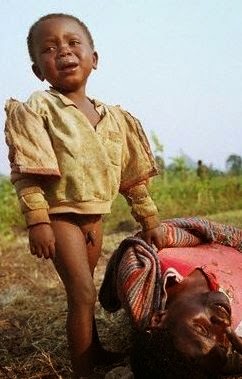
Can't forget. He murdered my mother. What should be my reaction? FYI: the number of orphans in Rwanda has skyrocketed since the 1990's Kagame's invasion. Much higher numbers of orphans had and have no other option but joining FDLR fighters who are identified as children that have Lost their Parents in Kagame's Wars inside and outside of Rwanda.If someone killed your child/spouse/parent(s) would you seek justice or revenge? Deep insight: What would you do to the person who snuffed the life of someone I love beyond reason? Forgiving would bring me no solace. If you take what really matters to me, I will show you what really matters. NITUTIRWANAHO TUZASHIRA. IGIHE KIRAGEZE.If democracy is to sell one's motherland(Africa), for some zionits support, then I prefer the person who is ready to give all his live for his motherland. Viva President Putin!!!
RPF committed the unspeakable
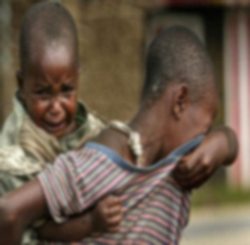
The perverted RPF committed the UNSPEAKABLE.Two orphans, both against the Nazi world. Point is the fact that their parents' murder Kagame & his RPF held no shock in the Western world. Up to now, the Rwandan Hitler Kagame and his death squads still enjoy impunity inside and outside of Rwanda. What goes through someone's mind as they know RPF murdered their parents? A delayed punishment is actually an encouragement to crime, In Praise of the ongoing Bloodshed in Rwanda. “I always think I am a pro-peace person but if someone harmed someone near and dear to me, I don't think I could be so peaceful. I would like to believe that to seek justice could save millions of people living the African Great Lakes Region - I would devote myself to bringing the 'perp' along to a non-happy ending but would that be enough? You'd have to be in the situation I suppose before you could actually know how you would feel or what you would do”. Jean-Christophe Nizeyimana, Libre Penseur
Inzira ndende
Search
Hutu Children & their Mums
Look at them ! How they are scared to death. Many Rwandan Hutu and Tutsi, Foreign human rights advocates, jounalists and and lawyers are now on Death Row Waiting to be murdered by Kagame and his RPF death squads. Be the last to know.
Rwanda-rebranding
Ways To Get Rid of Kagame
- The people should overthrow the Rwandan dictator (often put in place by foreign agencies) and throw him, along with his henchmen and family, out of the country – e.g., the Shah of Iran, Marcos of Philippines.Compaore of Burkina Faso
- Rwandans organize a violent revolution and have the dictator killed – e.g., Ceaucescu in Romania.
- Foreign powers (till then maintaining the dictator) force the dictator to exile without armed intervention – e.g. Mátyás Rákosi of Hungary was exiled by the Soviets to Kirgizia in 1970 to “seek medical attention”.
- Foreign powers march in and remove the dictator (whom they either instated or helped earlier) – e.g. Saddam Hussein of Iraq or Manuel Noriega of Panama.
- The dictator kills himself in an act of desperation – e.g., Hitler in 1945.
- The dictator is assassinated by people near him – e.g., Julius Caesar of Rome in 44 AD was stabbed by 60-70 people (only one wound was fatal though).
- Organise strikes and unrest to paralyze the country and convince even the army not to support the dictaor – e.g., Jorge Ubico y Castañeda was ousted in Guatemala in 1944 and Guatemala became democratic, Recedntly in Burkina Faso with the dictator Blaise Compaoré.
Almighty God :Justice for US
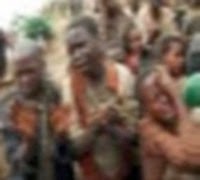
Hutu children's daily bread: Intimidation, Slavery, Sex abuses led by RPF criminals and Kagame, DMI: Every single day, there are more assassinations, imprisonment, brainwashing & disappearances. Do they have any chance to end this awful life?
Killing Hutus on daily basis

RPF targeted killings, very often in public areas. Killing Hutus on daily basis by Kagame's murderers and the RPF infamous death squads known as the "UNKNOWN WRONGDOERS"
RPF Trade Mark: Akandoya
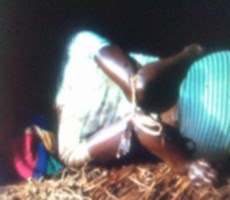
Rape, torture and assassination and unslaving of hutu women. Genderside: Rape has always been used by kagame's RPF as a Weapon of War, the killings of Hutu women with the help of Local Defense Forces, DMI and the RPF military
The Torture in Rwanda flourishes
Fighting For Our Freedom?
We need Freedom, Liberation of our fatherland, Human rights respect, Mutual respect between the Hutu majority and the Tutsi minority
KAGAME VS JUSTICE
- Is it right for the former US President to order the assassination of any one person in the world, whatever the pretext may be? Should RPF terrorism against Rwandans be tolerated and be used to bring peace to the Fascist regim?
- Are crackdowns fair on political parties and Hutu individuals in Rwanda?
- Is it honorable and sound for ALL OF YOU to keep silence about crimes committed by Paul Kagame and his RPF criminal organization?
- AS HUMAN BEINGS and Rwandans, why are negociable the Hutu people rights in Rwanda?
N.D.L.R.: Around 9 million victims of Congolese and Rwandans have been butchered. Paul Kagame, the bloody dictator goes ahead enjoying impunity and support from Evil. We are not about 9,000,000 dollars, we are about HUMAN BEINGS MASS SLAUGHTERED. In the list I published three weeks ago of the conflicts or other flashpoints in Africa which were likely to demand the attention of the Obama administration in Washington as well as of its international partners in the course of this year, third place was occupied by the Democratic Republic of Congo (DRC), the continent’s third largest state by area and its fourth largest by population (the new Secretary of State, Hillary Rodham Clinton, apparently agreed with me at least partially: in testimony at her Senate confirmation hearing, she listed “stopping the war in Congo” as the third objective for African policy, after countering terrorism in the Horn of Africa and helping Africans conserve and benefit from their natural resources).
In the list I published three weeks ago of the conflicts or other flashpoints in Africa which were likely to demand the attention of the Obama administration in Washington as well as of its international partners in the course of this year, third place was occupied by the Democratic Republic of Congo (DRC), the continent’s third largest state by area and its fourth largest by population (the new Secretary of State, Hillary Rodham Clinton, apparently agreed with me at least partially: in testimony at her Senate confirmation hearing, she listed “stopping the war in Congo” as the third objective for African policy, after countering terrorism in the Horn of Africa and helping Africans conserve and benefit from their natural resources).
 As it turns out, events on the ground moved quickly, leading both to an escalation of what had hitherto been a low-intensity proxy conflict and, ironically, to the possibility that a comprehensive resolution to the longstanding regional instability might actu
As it turns out, events on the ground moved quickly, leading both to an escalation of what had hitherto been a low-intensity proxy conflict and, ironically, to the possibility that a comprehensive resolution to the longstanding regional instability might actu ally be in sight.
ally be in sight. 
Is that the way in which the United States expresses its
respect for freedom, democracy and human rights?

In order to understand recent developments, it is necessary to place them in a larger context. As I argue in an essay in the current issue of the journal of the Royal United Services Institute for Defence and Security Studies,at the root of the DRC’s problems is the artificial and contrived nature of the Congolese state:
Goal: Swimming against the stream of hopes raised by President B. Obama.


 It is a not insignificant irony that the lamentable misery in which most of the citizens of the DRC find themselves – the country ranks 168th out of 177 countries surveyed in terms of human development according to the most recent survey by the [United Nations Development Programme] – is directly attributable to the immense natural wealth of the Congo itself. More than a century ago, it was these riches to be won which led Leopold II of the Belgians to hire Henry Morton Stanley to carve out for him a territory seventy-six times larger than his kingdom in Europe, an audacious private venture that was eventually sanctioned by the 1885 General Act of Berlin Conference.
It is a not insignificant irony that the lamentable misery in which most of the citizens of the DRC find themselves – the country ranks 168th out of 177 countries surveyed in terms of human development according to the most recent survey by the [United Nations Development Programme] – is directly attributable to the immense natural wealth of the Congo itself. More than a century ago, it was these riches to be won which led Leopold II of the Belgians to hire Henry Morton Stanley to carve out for him a territory seventy-six times larger than his kingdom in Europe, an audacious private venture that was eventually sanctioned by the 1885 General Act of Berlin Conference.Only because he happened to be born Hutu
His "Why" questions go unanswered.
 Although the inhuman depredations in the Belgian monarch’s demesne were widely condemned as brutal, even in comparison with the cruelties of colonial scramble of the time, no move was ever made to right the original historical wrong of throwing together in a single unit the size of Western Europe what has proven to be an explosive mixture of peoples with little historical basis for national cohesion…
Although the inhuman depredations in the Belgian monarch’s demesne were widely condemned as brutal, even in comparison with the cruelties of colonial scramble of the time, no move was ever made to right the original historical wrong of throwing together in a single unit the size of Western Europe what has proven to be an explosive mixture of peoples with little historical basis for national cohesion…Sadly, but not surprisingly, this state of affairs, whereby the challenges of geographic breadth are exacerbated by the temptations of fabulous wealth and the near total lack of responsive governance, has largely determined the course of events in the DRC. As what had passed for central government essentially withered, various armed groups imbued with a “fend-for-yourself” ethos simply used force to seize control of patches of territory, thus acquiring effective dominion over strategic assets which they then leveraged to acquire the wherewithal to combat opposing factions – all to the detriment of the overall peace of the country and the stability of its neighbors.

The 2002 “Sun City Agreement” brokered by then-South African President Thabo Mbeki was supposed to bring all the strife to close by ending the Second Congo War (1998-2003), a conflict aptly described as in the title of my friend Gérard Prunier’s eponymous new book as “Africa’s World War” given that the armies of nearly a dozen other African states, including those of Angola, Burundi, Chad, Namibia, Rwanda, Uganda, and Zimbabwe, had been drawn into the fighting. However, the terms of peace accord were never fully implemented, despite the presence of what is the largest United Nations peacekeeping operation in the world today, the Mission de l’Organisation des Nations-Unies au Congo (MONUC, “Mission of the United Nations Organization in the Democratic Republic of Congo”).
As I reported here two years ago, the 2006 national elections did little more than bestow a thin veneer of electoral respectability on an unsavory cast of characters, including President Joseph Kabila who, before he was even 30 years old, had inherited the presidential mantle from his assassinated warlord father Laurent-Désiré Kabila; Jean-Pierre Bemba, a vice president during the transitional administration who finished second in the presidential poll and was subsequently elected a senator before being arrested last year in Brussels on a warrant from the International Criminal Court which has charged him with five counts of war crimes and three counts of crimes against humanity; and the third place finisher in the race for president and subsequent prime minister (until last October), Antoine Gizenga, an octogenarian who in the 1960s had tried to set up his own government in Stanleyville (now Kisangani) with backing from the Soviet bloc.
Not surprisingly, despite the formal “peace,” conflicts continued in various parts of the DRC both before and after the national elections (despite the country’s legal name, democratic local elections have never been held since the Congolese achieved independence from Belgium in 1960). In the eastern Congo, particularly the provinces of North Kivu and South Kivu, militiamen loyal to the Congrès National pour la Défense du Peuple (CNDP, “National Congress for the Defense of the People”), a largely Tutsi group led by a General Laurent Nkunda and surreptitiously backed by Rwanda, continued its fight against the Forces Démocratiques de la Libération du Rwanda (FDLR, “Democratic Forces for the Liberation of Rwanda”), a group of armed Hutu insurgents, including some of the génocidaires responsible for the 1994 genocide, which enjoyed the backing of the commanders of the Forces Armées de la République Démocratique du Congo (FARDC, “Armed Forces of the Democratic Republic of Congo”) and, presumably, of the Kabila regime.
By 2007, Nkunda was in open rebellion against the far-off government in Kinshasa, which tried and failed to dislodge him militarily. After the collapse of several attempts at mediation, fighting broke out anew in the fall of 2008, which resulted in the CNDP gaining control of most of North Kivu after the FARDC failed spectacularly in an attempt to take down General Nkunda in open battle.
In December, when I was in the Rwandan resort town of Gisenyi, just next door to the North Kivu capital of Goma on the shores of Lake Kivu, the smallest of Africa’s Great Lakes, it looked like the conflict was set to be a protracted one. My conversations with international observers as well as senior Rwandan officials reaffirmed the diagnosis I made in this column three months ago that nothing would change unless the Kabila regime: (1) acknowledged the reality of the CNDP, with which it was refusing to talk, and (2) addressed the security concerns of Rwanda over the continuing presence on Congolese territory of the Hutu killers.
Both, as I have repeatedly argued, are legitimate factors which have largely been sidelined in the otherwise fruitless talks being conducted in Nairobi, Kenya, under the chairmanship of the United Nations Secretary-General’s special envoy for the Great Lakes region, former Nigerian President Olusegun Obasanjo, and the African Union’s special envoy, former Tanzanian President Benjamin Mkapa.
Whatever anyone else might think of General Nkunda’s CNDP, the movement was viewed by many residents of the Kivus as their protector against the predations of both FARDC troops and irregulars allied with it. While CNDP militiamen are generally not paid for their service, they are fed and receive medical care. Their families likewise benefit from a primitive social welfare
 system. In short, the group provides its adherents – whose ranks have expanded beyond the core base of ethnic Tutsi to embrace ethnic Nandé, Nyanga, and Shi as well as more than a few ethnic Hutu – with precisely the social goods that the Kabila regime has thus far failed to make provision for and, hence, has an effective political legitimacy whose influence needs to be recognized.
system. In short, the group provides its adherents – whose ranks have expanded beyond the core base of ethnic Tutsi to embrace ethnic Nandé, Nyanga, and Shi as well as more than a few ethnic Hutu – with precisely the social goods that the Kabila regime has thus far failed to make provision for and, hence, has an effective political legitimacy whose influence needs to be recognized.After all, the FDLR makes no secret of its ambitions: its website, emblazoned with the flag of the “Hutu power” regime that ruled from 1962 until 1994, brands the current government in Kigali a “tyrannic [sic] and barbaric regime” andproclaims its goal to “liberate Rwanda.” The FDLR supports itself by mining gold, nickel, tungsten, and other minerals in the areas under its control, operating primitive mines in collaboration with Congolese businessmen, many of whom are politically connected. What sovereign state, much less one that undergone the trauma that Rwanda has, could be expected to put up with such a provocation?
While the Nairobi talks convened by the UN and AU envoys continued, shifts were taking place closer to the ground. Three weeks ago, the chief of the general staff of the Rwandan Defense Force (RDF), General James Kabarebe flew to Kinshasa to meet with President Kabila of the DRC, causing a flurry of rumors about a secret deal. A week later, a group of CNDP leaders led by the CNDP’s chief of staff, Bosco Ntaganda, announced that it had removed Nkunda.
Ntaganda, known as “The Terminator,” is sought on an International Criminal Court arrest warrant for the war crimes of enlistment and conscription of children and using them in combat, although the charges date from his earlier association with another militia, Thomas Lubanga’s Forces Patriotiques pour la Libération du Congo (FPLC, “Patriotic Forces for the Liberation of Congo”), active in northeastern Ituri province during the latter phase of the Second Congo War. While Nkunda’s supporters discounted the maneuver, it gained traction when General Kabarebe appeared alongside DRC Interior Minister Célestin Mbuyu at a meeting of the dissident CNDP leaders, who declared a ceasefire and said that they were prepared to now integrate into the FARDC to fight the FDLR.
These developments were but a prelude for the entente between Kigali and Kinshasa which was unveiled over the course of the week. First, Rwandan troops entered the eastern part of the DRC with the Kinshasa’s assent to pursue the FDLR. Reports are that up to 7,000 Rwandan troops have been sent in the effort to flush out the Hutu militia. While the deployment was officially a joint operation involving both RDF and FARDC units, it was clear that the highly-trained Rwandans were spearheading the thrust. Second, in perhaps the biggest surprise of all, Rwandan forces arrested General Nkunda, who had entered Rwanda as the joint operation began.
Over the weekend, the arrest sparked demonstrations – which were quickly dispersed – by Congolese Tutsis, including some in refugee camps in Rwanda, among whom the general is still popular. The arrest also belied parts of a December 2008 report by the UN Group of Experts on the DRC which alleged a close relationship between the Rwandan government and Nkunda beyond the common interest in preventing a resurgence of the FDLR.
While international nongovernmental organizations have expressed concern about the turn of events – the International Committee of the Red Cross solemnly reminded the parties to the conflict of their obligation “to preserve the lives and dignity of the civilian population and of people wounded or captured during the fighting,” while the International Crisis Group put out a press release warning of “an even greater humanitarian crisis” and Amnesty International called upon the governments “to develop clear plans to prevent reprisal attacks against civilians by the FDLR…and to ensure that civilians do not pay the price of these military offensives” – may present a significant opportunity to break the logjam that has kept the heart of African continent locked in conflict for too long.
If military coordination can lead to security cooperation between Kigali and Kinshasa, then perhaps it might be hoped that the current operations could prove to be a “confidence building measure” through which the two neighbors, so long at odds, might be led to discern that it might be in both their interests to strive for a comprehensive political settlement and then, with effort and a bit of luck, joint economic development, leveraging the comparative advantages of each country: Congo’s wealth in terms of raw materials and Rwanda’s growing economy – it grew 10% in 2008, beating mid-year predictions of a 7% increase, despite the global downturn – with its efficient government and private-sector-friendly policies (on how the Rwandan economy is different from that of most African countries, see the article last year on “The Rwandan Paradox” by Mauro De Lorenzo of the American Enterprise Institute for Public Policy Research).
Of course, for now, this is all aspiration. More immediately, the direct Rwandan intervention raises a number of questions, beginning with how long the RDF will remain in the two Kivus. Among the Hutu militants currently being pursued across the inhospitable terrain of North Kivu are some 7,000 individuals wanted in Rwanda for having taken part in the genocide. Certainly the Rwandan forces cannot be expected to withdraw until the FDLR is totally disarmed, a task which the 18,422 personnel of MONUC with their $1.2 billion annual budget has been unable to accomplish in eight years.
N.DL.R. THE SAME PRETEXT HAS BEEN RAISED IN 1995 in Kibeho, then in 1996, 1997 and 1998 to cover up the genocide policy against Hutu ethic members. You know the tragic result.
Moreover, even if the Hutus no longer pose a military threat to Rwandan state, any government in Kigali would still have a tutelary interest in the fate of the vulnerable Tutsi minority in eastern Congo. Add to these calculations the temptations of the region’s abundant resources and one could see a scenario whereby Rwanda maintains a presence in the Kivus for some time, either openly through a status of forces agreement with the Kabila regime in Kinshasa or via proxy in the form of a reconstituted CNDP, presumably under a more malleable leader than the irascible General Nkunda.
The international community has been slow to react to the changing dynamics, much less seize upon the opportunity presented by current rapprochement between Kigali and Kinshasa to move beyond conventional remedies which have proven ineffective towards creative solutions based on on-the-ground realities and local legitimacies. President Barack Obama, whose foreign policy agenda on the White House website specifically cites “countering instability in Congo” as one of three examples of his Senate record of “bringing people together…to advance important policy initiatives,” has yet to even nominate an assistant secretary to head the U.S. State Department’s Africa Bureau, much less a special envoy to deal with the various conflicts across the Great Lakes region, most of which are beyond the scope of any one ambassador’s mission.
The United Nations has done little more in recent days than to send the Secretary-General’s special representative in the DRC, Briton Alan Doss, a lifelong UN employee, on another fact-finding tour of North Kivu (to his credit, MONUC’s military commander, Senegalese General Babacar Gaye, did announce on Wednesday that his force would provide transport and medical assistance to the new campaign against the Hutu rebels). As for the African Union, the chairperson of the AU Commission, Jean Ping, managed to make it through his monthly press conference on Tuesday without even mentioning the word “Congo.” Despite these disappointments, the mere fact that – at least for the moment – Rwanda and the Congo are not pulling in entirely opposite directions is in itself reason enough to give rise to hope.
In addition to serving on the boards of several international and national think tanks and journals, FamilySecurityMatters.org Contributing Editor Dr. J. Peter Pham has testified before the U.S.Congress. Feedback:editorialdirector@familysecuritymatters.org.
The Truth can be buried and stomped into the ground where none can see, yet eventually it will, like a seed, break through the surface once again far more potent than ever, and Nothing can stop it. Truth can be suppressed for a "time", yet It cannot be destroyed. ==> Wolverine
AS International
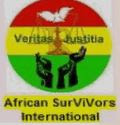
SurViVors SPEAK OUT - Rights of Victims Seeking Justice and Compensation for the RPF Genocide. This is an Exciting Collaborative Project launched by The AS International Founder Jean-Christophe Nizeyimana, Economist and Human Rights Activist. Join US and Be the First to know about the Mastermind of the Rwandan Genocide Still At large and enjoing Impunity.
Profile
Genocide masterminded by RPF
Human and Civil Rights
Rwanda: A mapping of crimes
KIBEHO: Rwandan Auschwitz
Mass murderers C. Sankara
Stephen Sackur’s Hard Talk.
Prof. Allan C. Stam
Prof. Christian Davenport
The killing Fields - Part 1
The killing Fields - Part II
Daily bread for Rwandans
The killing Fields - Part III
Time has come: Regime change
Drame rwandais- justice impartiale
Sheltering 2,5 million refugees
Latest videos
Rwanda's Untold Story
Rwanda, un génocide en questions
Bernard Lugan présente "Rwanda, un génocide en... par BernardLugan Bernard Lugan présente "Rwanda, un génocide en questions"
Nombre de Visiteurs
Pages
Popular Posts - Last 7 days
-
[Since 1994, the world witnesses the horrifying Tutsi minority (14%) ethnic domination, the Tutsi minority ethnic rule with an iron hand,...
-
[Since 1994, the world witnesses the horrifying Tutsi minority (14%) ethnic domination, the Tutsi minority ethnic rule with an iron hand,...
-
This is not an ASI publication. ASI is not responsible for, nor does it endorse, its content. Any views expressed are solely those of the...
-
Professor and Constitutional Criminal Lawyer Peter Erlinder is interviewed by host Karen Redleaf. Watch this video to understand: http://ou...
-
Kananga foot shufflers, April 19, 2003 Kinshasa, May 4, 2003 » Kigali, Rwanda, April 22, 2003 “How many lives in danger are necessary for a...
-
Les survivants du génocide rwandais INSISTENT sur l'embargo contre le régime nazi du FPR Le Control Arms, qui a révélé ces Affaires, ...
-
AS International survivors are sincerely thankful for the Guardian Great Job in revealing some Truth about the Rwandan genocide. By Hele...
-
<===Mon oeil! *** Once uncovered, the Impostor will always flee, but he may return in another form, believe me! *** Depuis quelques jou...
-
[Since 1994, the world witnesses the horrifying Tutsi minority (14%) ethnic domination, the Tutsi minority ethnic rule with an iron hand...
-
[Since 1994, the world witnesses the horrifying Tutsi minority (14%) ethnic domination, the Tutsi minority ethnic rule with an iron hand,...
Archives
-
▼
2009
(388)
-
▼
January
(25)
- Le premier procès devant la CPI commence dans la c...
- La Communauté Rwandaise Hutu de l'étranger encore ...
- Exclusif: le livre qui peut ruiner Kouchner
- New Twists in Congo Conflict – and Just Maybe a Tu...
- Rwanda: Congresswoman Cynthia Mc Kinney On Truth a...
- Kabila betrays the FDLR
- Rusesebagina letter to B. Obama, US President
- FDLR speak out from life-experience of witnessing ...
- The DRC President, the actual threat for peace in ...
- Copy/Paste journalists raise criminal issues
- GOMA/BUKAVU: TESTIMONY OF A DIRECT EYE WITNESS
- Get Involved. No vice without its punishment? A ge...
- FDLR PRESS RELEASE No. 02/SE/CD/JANUARY/ 2009
- Behind the Scenes at the Hotel Rwanda
- It’s Official: Rwanda is Committing Genocide in D....
- “COMBAT MEDIC” ‘An Australian’s eyewitness account...
- If You Campain for arresting Paul Kagame, then you...
- La colère de l'UCDP, Comment cela est-il possible?
- Analyse : ** Le monde victime d’inhumanité sans f...
- The Hunt: Me and My War Criminals
- War Crimes and Rwanda
- MASSACRES COMMIS PAR LE FPR DANS LA PREFECTURE DE ...
- Les massacres de Kibeho ...me rappellent le camp ...
- Les massacres de Kibeho
- Lettre ouverte à Kenneth Roth, Directeur de HRW T...
-
▼
January
(25)




0 comments:
Post a Comment